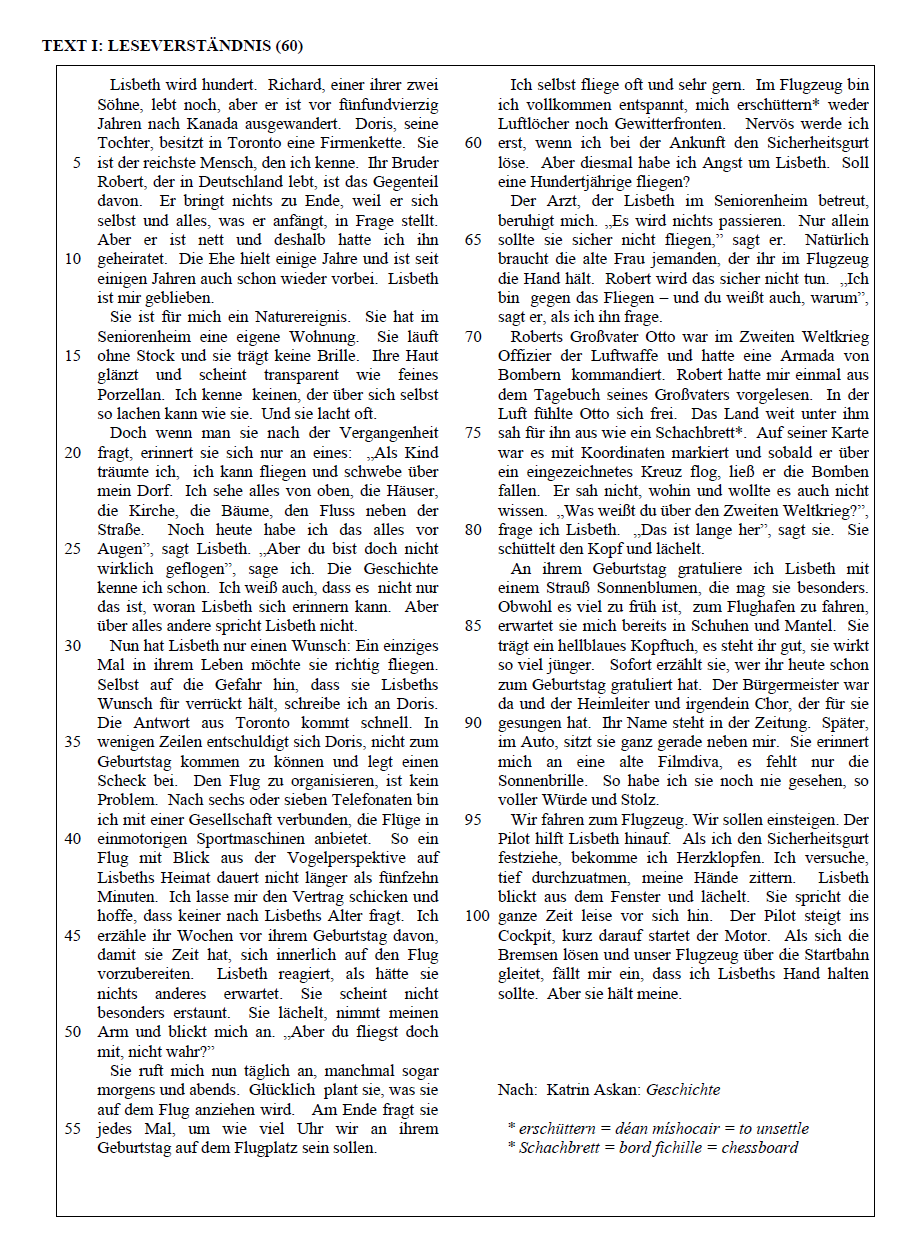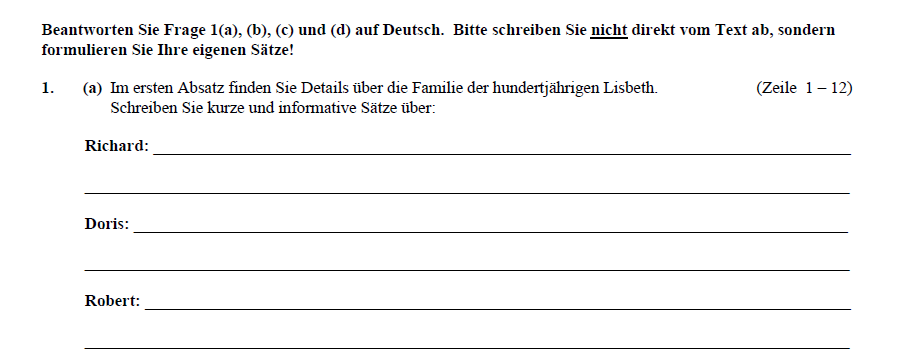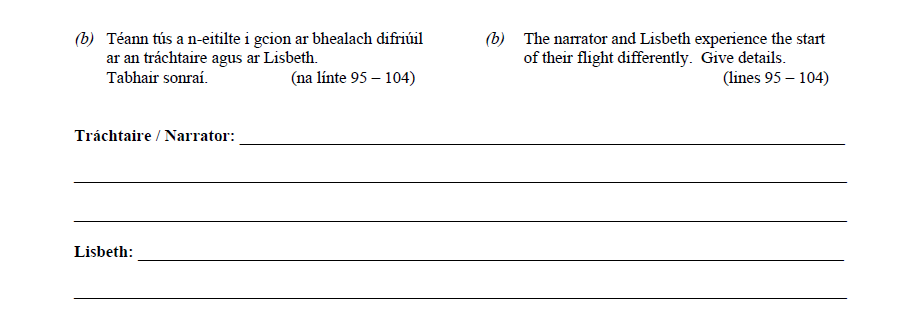
- ä
- ö
- ü
- ß
Open List of Vocabulary for this Text
| German | English | Category |
|---|---|---|
| auswandern | to emigrate | verb |
| besitzen | to own | verb |
| die Firmenkette | chain of businesses | noun |
| das Gegenteil | opposite | noun |
| zu Ende bringen | to finish | phrase |
| in Frage stellen | to question | phrase |
| heiraten | to marry | verb |
| die Ehe | marriage | noun |
| halten | to hold, to keep | verb |
| das Naturereignis | natural phenomenon | noun |
| das Seniorenheim | retirement home | noun |
| der Stock | stick | noun |
| glänzen | to shine | verb |
| die Vergangenheit | past | noun |
| sich erinnern an | to remember, to recollect | verb |
| schweben | to hover, to float | verb |
| der Wunsch | wish | noun |
| auf die Gefahr hin | at the risk of | phrase |
| die Zeile | line | noun |
| sich entschuldigen | to apologise | verb |
| beilegen | to attach | verb |
| die Gesellschaft | organisation | noun |
| anbieten | to offer | verb |
| der Blick | view | noun |
| die Vogelperspektive | bird's-eye view | noun |
| der Vertrag | contract | noun |
| erzählen von | to tell about | verb |
| innerlich | mentally | adjective |
| vorbereiten | to prepare | verb |
| scheinen | to seem | verb |
| erstaunt | astonished | adjective |
| anblicken | to look at | verb |
| nun | now | noun |
| sogar | even | adverb |
| anziehen | to put on | verb |
| der Flugplatz | airfield | noun |
| vollkommen | entirely | adjective |
| entspannt | relaxed | adjective |
| erschüttern | to unsettle | verb |
| das Luftloch | air pocket | noun |
| die Gewitterfront | storm front | noun |
| die Ankunft | arrival | noun |
| der Sicherheitsgurt | seatbelt | noun |
| lösen | to release | verb |
| betreuen | to look after | verb |
| beruhigen | to reassure | verb |
| der Weltkrieg | world war | noun |
| kommandieren | to command | verb |
| das Tagebuch | diary | noun |
| vorlesen | to read aloud | verb |
| die Luft | air | noun |
| das Schachbrett | chessboard | noun |
| sobald | as soon as | conjunction |
| eingezeichnet | marked | adjective |
| das Kreuz | cross | noun |
| fallen lassen | to drop | verb |
| schütteln | to shake | verb |
| gratulieren | to congratulate | verb |
| der Strauß | bouquet | noun |
| erwarten | to expect | verb |
| gut stehen | to suit | verb |
| wirken | to appear | verb |
| fehlen | to be missing | verb |
| die Würde | dignity | noun |
| der Stolz | pride | noun |
| festziehen | to tighten | verb |
| das Herzklopfen | palpitation | noun |
| tief durchatmen | take a deep breath | phrase |
| zittern | to tremble | verb |
| blicken | to look | verb |
| leise | quietly | adjective |
| kurz darauf | moments later | phrase |
| die Bremse | brake | noun |
| gleiten | to glide | verb |
| einfallen | to come to mind | verb |

See Answers
(6 marks: 2 x 1 marks ; 2 x 1 marks ; 2 x 1 marks) Any 2 of the following details for each:
Richard:
1. Er ist Lisbeths Sohn.
2. Er ist einer von zwei Söhnen. / Er hatte einen Bruder.
3. Er lebt noch / seit fünfundvierzig Jahren in Kanada.
4. Er hat eine Tochter. / Seine Tochter heißt Doris.
5. Er hat einen Sohn. / Sein Sohn heißt Robert.
Doris:
1. Doris ist Richards Tochter. / Ihr Vater heißt Richard.
2. Sie hat einen Bruder. / Ihr Bruder heißt Robert.
3. Sie hat eine Firmenkette in Toronto.
4. Sie ist sehr reich. / Sie hat sehr viel Geld.
5. Doris ist Lisbeths Enkelin. / Lisbeth ist ihre Großmutter.
Robert:
1. Robert ist Richards Sohn. / Sein Vater heißt Richard.
2. Er hat eine Schwester. / Seine Schwester heißt Doris.
3. Er lebt in Deutschland.
4. Er ist das Gegenteil von seiner Schwester.
5. Er macht nie etwas zu Ende. / Er stellt sich / alles immer in Frage.
6. Er ist sympathisch / nett.
7. Er war mit der Erzählerin verheiratet. / Er ist geschieden.
8. Robert ist Lisbeths Enkel. / Lisbeth ist seine Großmutter.

See Answers
(4 marks: 2 x 2 marks) Any 2 of the following:
1. Sie träumte, sie könnte fliegen. / Sie träumte vom Fliegen. / Sie konnte fliegen.
2. Sie träumte, sie schwebte über ihr Dorf.
3. Sie sah alles / ihr Dorf / die Häuser… von oben / aus der Luft.

See Answers
(6 marks: 2 marks ; 2 x 2 marks)
Wunsch: Lisbeth möchte einmal richtig / mit einem Flugzeug fliegen. (2)
Any 2 of the following:
1. Sie schreibt an Doris / Lisbeths Enkelin.
2. Sie organisiert einen Flug.
3. Sie telefoniert sechs /sieben Mal.
4. Sie lässt sich einen Vertrag schicken.
5. Sie erzählt Lisbeth von dem Flug. / Sie bereitet Lisbeth auf den Flug vor.

See Answers
(4 marks: 2 x 2 marks) Any 2 of the following:
1. Sie fliegt oft / gern.
2. Sie ist total entspannt.
3. Sie hat keine Angst vor Luftlöchern / Gewitterfronten.
4. Sie wird erst bei der Ankunft / nach der Landung nervös.

See Answers
(4 marks: 2 x 2 marks) Any 2 of the following:
1. Lisbeth reacts as if she had not expected anything else.
2. Not surprised / amazed.
3. She smiles.
4. She takes the narrator’s arm. / She looks at the narrator.
5. She asks (the narrator): “You are going to fly with me, aren’t you?”
6. She calls the narrator every day / sometimes both in the morning and evening.
7. She plans what she is going to wear on the flight.
8. She constantly asks at what time they are to meet at the airport / airstrip on her birthday.

See Answers
(8 marks: 4 x 2 marks) Any 4 of the following:
1. Otto is Robert’s grandfather.
2. He was an officer during / fought in the Second World War / in the Luftwaffe.
3. He was commander / in command of an armada / fleet of bombers.
4. He kept a diary.
5. He felt free / liberated when flying / in the air.
6. To him, the land underneath (his plane) looked like a chessboard.
7. He dropped bombs.
8. He did not see / didn’t want to know where they landed.

See Answers
(8 marks: 4 x 2 marks) Any 4 of the following:
1. The narrator brings / congratulates her with sunflowers.
2. Lisbeth is already waiting for her (wearing coat and shoes).
3. She wears a (light) blue head scarf.
4. She tells the narrator who came to congratulate her. / The Lord Mayor / The head of the nursing home comes to congratulate her.
5. A choir sings for her.
6. Lisbeth’s name appears in the (news)paper.
7. She and the narrator go to airport by car.
8. Lisbeth reminds the narrator of / looks like an elderly film star.

See Answers
(8 marks: 2 x 2 marks ; 2 x 2 marks) Any 2 of the following details for each:
Narrator:
1. Her heart is pounding.
2. She tries to breathe deeply.
3. Her hands are trembling.
4. It occurs to / dawns on her that she is supposed to / should be holding Lisbeth’s hand.
Lisbeth:
1. The pilot helps her to get aboard the plane.
2. She looks out of the window.
3. She smiles.
4. She quietly talks to herself.
5. She holds the narrator’s hand.

See Answers
(12 marks: 3 x 4 marks) Any 3 of the following:
(Content)
1. She is 100 years old.
2. The author / narrator describes Lisbeth as a ‘natural phenomenon’ (ein Naturereignis).
3. She points out that… …Lisbeth still has her own apartment in a nursing home (indicating her independence).
4. …Lisbeth still walks without a stick.
5. …she does not need glasses.
6. …her skin is described as radiant and transparent like delicate china.
7. …Lisbeth can laugh at / about herself.
8. Even when told that she is getting her big dream of flying fulfilled, Lisbeth doesn’t seem to be surprised or excited – she just smiles.
9. Instead of worrying about her first ever flight, Lisbeth plans what to wear.
10. When wearing a light blue head scarf, Lisbeth looks so much younger.
11. The mayor / the head of the home / a choir / people came to congratulate her on her birthday.
12. Lisbeth resembles an elderly film diva.
13. There is an air of dignity and pride around the centenarian.
14. Lisbeth is not worried about the flight: she looks out the window and smiles.
15. Lisbeth holds the narrator’s hand – and not the other way around.
(Language use)
1. Use of poignant short sentences to describe Lisbeth’s amazing fitness and independence (Sie läuft ohne Stock und sie trägt keine Brille…)
2. Repetitive use of the verbs ‘lachen’ and ‘lächeln’ to emphasise Lisbeth’s positive attitude and outlook on life.
3. Contrasting language to describe the (much younger) narrator’s feelings when flying with one hundred year old Lisbeth: ‘Herzklopfen, Hände zittern’ compared with: ‘Lisbeth blickt aus dem Fenster und lächelt’.
4. Abbreviated sentence to finish the narration: ‘Aber sie hält meine.’ to express admiration (and surprise) because Lisbeth keeps her smile and her calm even on her first ever flight – at the age of one hundred.
5. Use of poetic nouns like dignity (‘Würde’), and pride (Stolz’).
6. First and last sentences are short and dramatic. The first sentence conjures up a great sense of achievement in Lisbeth reaching 100. And the final sentence demonstrates how this very old lady calms the narrator by taking her hand on the flight.



